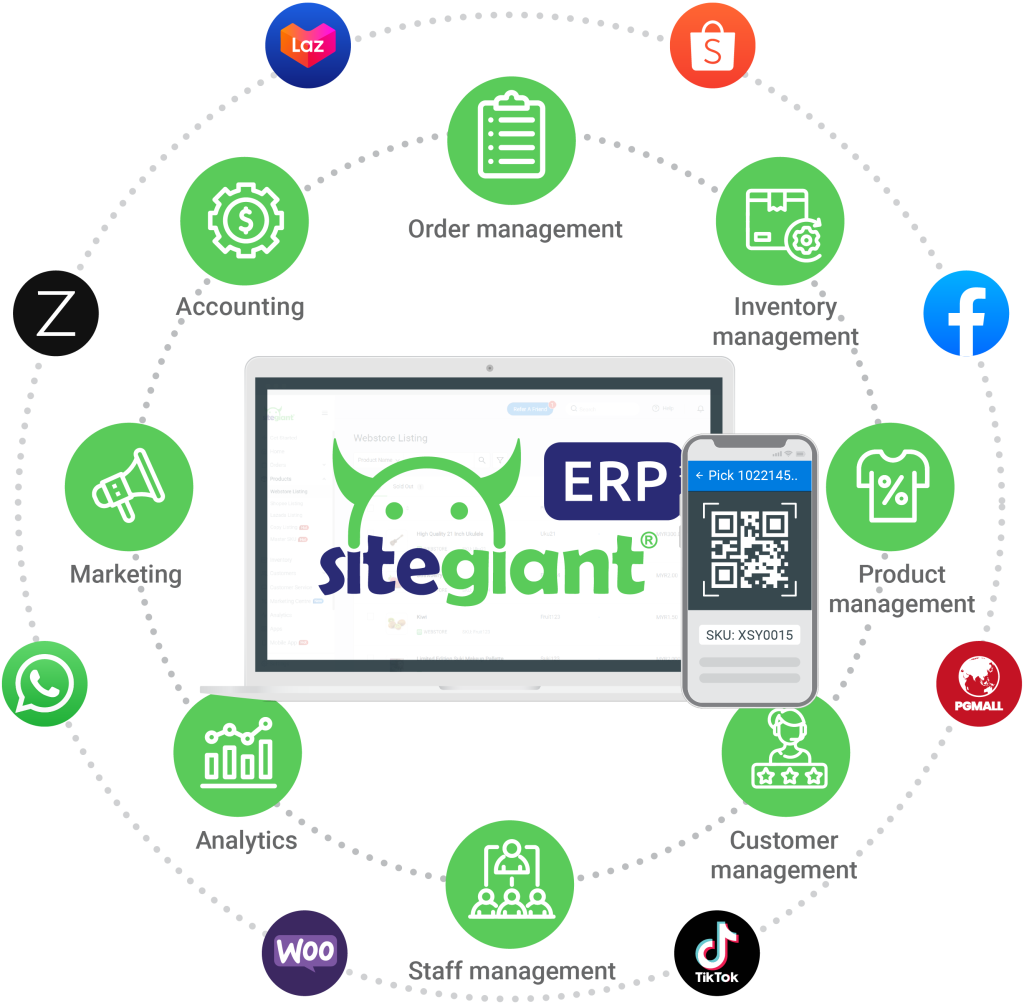
Running an eCommerce business often feels like juggling numerous tasks — managing orders, inventory, shipping, and customer enquiries — all at once. Streamlining these processes can seem overwhelming, but Enterprise Resource Planning (ERP) systems can simplify and automate tasks, helping eCommerce sellers run their businesses more efficiently.
But what exactly is an ERP system and how does it benefit eCommerce sellers? Let’s dive into:
1. What is an ERP system?
2. Top 5 Benefits of ERP Systems for eCommerce Sellers
3. Investing in The Right ERP System
What is an ERP System?
An ERP system serves as the digital backbone of your business. It centralizes core functions like inventory management, order processing, customer relationship management (CRM), financial operations, and more giving you a comprehensive view of your business and improving operational efficiency.

Source: Freepik
For eCommerce sellers, managing various platforms manually can be chaotic. However, an ERP system integrates data from different sources and automates repetitive tasks, offering real-time insights into your business operations.
Top 5 Benefits of ERP Systems for eCommerce Sellers
Let’s explore how an eCommerce ERP system benefits your business:
1. Optimize Inventory Management
Managing stock across multiple sales channels is crucial for preventing overselling and stockouts, which can lead to lost revenue and frustrated customers. With an eCommerce ERP system, you get real-time inventory updates across all channels, ensuring accurate stock levels. This automation minimizes manual errors and saves valuable time.

Source: Freepik
2. Streamline Order Fulfillment
Fast and accurate order fulfillment is critical for customer satisfaction. An eCommerce ERP system simplifies your tasks by consolidating orders from various marketplaces, automating tracking, and managing inventory updates, making order processing more efficient. This results in faster, more accurate delivery and happier customers.

Source: Freepik
3. Strengthen Customer Relationships
With marketing tools, you can attract and drive more targeted traffic to your store, reaching the right customers. It also empowers you to create personalized promotions and improve customer segmentation. Additionally, utilize MultiChat, which enables you to respond to queries across multiple channels, enhancing response times and building stronger customer relationships.
Source: Freepik
4. Improve Accounting Processes with Greater Accuracy
Accounting can be time-consuming, especially with manual processes. An eCommerce ERP system streamlines eCommerce bookkeeping by syncing orders with your accounting software and generating accurate financial reports, such as e-invoices, for timely submission. This not only reduces errors but also ensures your bookkeeping is always up to date.

Source: Freepik
5. Leverage Real-Time Reporting for Better Business
ERP systems deliver real-time analytics and reporting by integrating sales, inventory, and customer data in one place. This allows you to spot trends and identify growth opportunities. Automated reporting tools reduce time spent on number-crunching, letting you focus on strategic growth.

Source: Freepik
Investing in The Right ERP System
In today’s competitive eCommerce landscape, choosing the right ERP system is key to success, while choosing the right vendor is just as important.
That’s why we developed SiteGiant ERP, a comprehensive solution designed to seamlessly connect all your business processes for maximum efficiency, empowering you to thrive in any marketplace with confidence.
With over 50 ready integrations, including marketplaces, payment gateways, WMS features, accounting software, and shipping logistics – SiteGiant ERP streamlines your multichannel operations with ease. Best of all, it is the only eCommerce ERP in Malaysia with built-in webstore and POS integrations!

Say goodbye to manual processes and discover how SiteGiant ERP keeps your eCommerce business ahead through continuous innovation.










